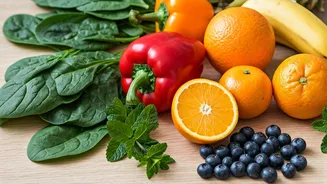Embrace Ginger's Power
Ginger, a spice celebrated for its culinary and medicinal properties, can be a game-changer for easing gas and bloating. It contains gingerol, a compound
known for its anti-inflammatory and digestive benefits. Ginger aids digestion by accelerating the emptying of the stomach and reducing the production of gas. It's also been shown to relax the intestinal muscles, which can help alleviate cramping and discomfort. Incorporating ginger into your diet is easy. You can add fresh ginger to your cooking, drink ginger tea, or take ginger supplements. Many find that even a small amount of ginger can bring noticeable relief. If you experience frequent bloating or gas, ginger could become a valuable ally in your quest for digestive comfort.
Peppermint's Soothing Touch
Peppermint, whether consumed as a tea or taken in supplement form, is another excellent remedy for easing gas and bloating. It is a natural antispasmodic, meaning it can help relax the muscles of the digestive tract. This relaxation can reduce spasms and ease the pain and discomfort associated with bloating. Peppermint contains menthol, which has been shown to reduce the symptoms of irritable bowel syndrome (IBS), a condition often characterized by bloating, gas, and abdominal pain. Drinking peppermint tea after meals or using peppermint oil capsules can significantly ease digestive distress. While peppermint is generally safe, it's wise to start with a small amount and observe how your body reacts, especially if you have existing digestive issues.
Unlock Fennel's Magic
Fennel seeds, a common ingredient in Indian cuisine, are well-known for their digestive benefits. These seeds contain compounds that help relax the intestinal muscles, which can reduce bloating and gas. They also promote the production of digestive enzymes, which aid in breaking down food more efficiently. This, in turn, can reduce the likelihood of gas formation. Fennel can be consumed in various ways; some people chew fennel seeds after meals to aid digestion, make fennel tea, or incorporate fennel bulbs into salads and cooked dishes. The versatility of fennel makes it easy to integrate into your daily routine. Regularly using fennel can become a natural strategy for a more comfortable digestive experience.
Papaya for Digestion
Papaya is a tropical fruit that is packed with an enzyme called papain. This enzyme is effective in breaking down proteins, which supports efficient digestion and reduces the chance of bloating. Papain helps to prevent undigested food from fermenting in the gut, which is a major cause of gas. Furthermore, papaya has anti-inflammatory properties, making it helpful in soothing the digestive tract. Eating fresh papaya or drinking papaya juice can be a delicious way to improve digestion and reduce bloating. For those with digestive issues, including papaya in your diet could bring noticeable relief. Papaya's sweet taste makes it an enjoyable addition to your daily intake while contributing to gut health.
Pineapple's Digestive Aid
Pineapple, similar to papaya, contains an enzyme called bromelain. Bromelain aids in breaking down proteins and reduces inflammation in the gut. This process supports smoother digestion and significantly decreases gas and bloating. The consumption of pineapple, whether fresh or as juice, is an excellent way to introduce bromelain into your diet. Bromelain also helps in the absorption of nutrients, improving overall gut health. If you are prone to bloating after meals, adding pineapple to your diet may be an effective and flavorful solution. Its sweet taste and beneficial properties make pineapple a beneficial choice for digestive comfort.
The Power of Yogurt
Yogurt, particularly varieties containing live and active cultures (probiotics), introduces beneficial bacteria to your gut, which can aid in digestion and minimize gas and bloating. These probiotics help balance the gut microbiome, which is essential for healthy digestion. Certain strains of probiotics, such as Lactobacillus and Bifidobacterium, have been proven effective in reducing bloating and gas symptoms. Regular consumption of yogurt, especially plain or Greek yogurt, provides a simple, accessible way to support gut health. Ensure the yogurt contains active cultures, and consider it as a part of a balanced diet for overall well-being. Look for yogurt with no added sugars for the best results.
Bananas: Gut-Friendly Fruit
Bananas are a great source of potassium, which plays a critical role in regulating fluid balance and preventing water retention, a major contributor to bloating. Moreover, bananas are rich in fiber, which supports healthy bowel movements and helps prevent constipation, often linked with bloating and discomfort. The soluble fiber in bananas aids digestion by adding bulk to the stool, making it easier to pass. Bananas are also gentle on the stomach and easy to digest, making them a safe choice for those experiencing bloating. Including bananas in your daily meals is a simple and effective method for improving digestive health and minimizing bloating naturally. Their convenience and nutritional value make them an ideal snack or addition to meals.
Cucumber's Hydrating Relief
Cucumbers are high in water content and are a natural diuretic, which can help flush out excess water and reduce bloating caused by water retention. They also contain compounds that can soothe the digestive tract, decreasing gas and discomfort. The fiber in cucumbers contributes to regular bowel movements, preventing constipation and bloating. Adding cucumber to your diet is refreshing and easy; you can eat them in salads, as a snack, or in infused water. They are low in calories and provide hydration, helping with both bloating and overall health. Including cucumber in your diet can be a refreshing and beneficial step towards reducing bloating and improving digestive health.
Turmeric's Anti-Inflammatory Action
Turmeric, with its active compound curcumin, is well-known for its anti-inflammatory properties that can soothe the digestive tract and reduce bloating. Curcumin has been shown to reduce gas production and improve overall gut health. It also aids in the digestion of fats, reducing the likelihood of digestive issues. Turmeric can be used in cooking, added to smoothies, or taken as a supplement. Using turmeric is a practical way to fight inflammation and gas-related bloating. Pairing turmeric with black pepper enhances the absorption of curcumin, making it more effective. Making turmeric a regular part of your diet can bring both digestive relief and long-term health benefits.
Leafy Greens: Fiber's Heroes
Leafy green vegetables such as spinach, kale, and lettuce are high in fiber, which is crucial for healthy digestion and preventing bloating. The fiber in these greens adds bulk to your stool, promotes regular bowel movements, and prevents constipation, a major cause of bloating. Leafy greens also provide essential nutrients that support overall gut health. Eating these greens raw, in salads, or lightly cooked will help to preserve their fiber content. Including a variety of leafy greens in your diet not only helps to reduce bloating but also provides essential vitamins and minerals that boost your overall health. These vegetables are versatile and easy to add to meals, making them an excellent choice for anyone seeking to improve their digestive health.





















